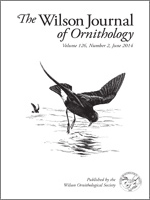We applied a Monte Carlo approach to test for both individual and group level laterality preferences in neck looping by American Flamingos (Phoenicopterus ruber ruber) at rest. We found no evidence of individual or group-level preferences, contrary to the results of previous studies. In the present data, the appearance of bias tended to decrease as the number of observations increased, suggesting that apparent lateral bias may be largely because of stochastic error. Pair members tended to loop the neck to the same side on the same day to a greater extent than expected by chance, implying that social factors can act contrary to any individual lateral preference that may exist in this species.
How to translate text using browser tools
1 June 2014
Testing for Behavioral Lateralization in Observational Data: a Monte Carlo Approach Applied to Neck-looping in American Flamingos
Austin L. Hughes,
Jonathan Cauthen,
Caroline Driscoll
ACCESS THE FULL ARTICLE

The Wilson Journal of Ornithology
Vol. 126 • No. 2
June 2014
Vol. 126 • No. 2
June 2014
Flamingo
laterality
social dominance




